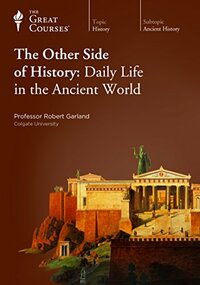Take a photo of a barcode or cover
Roman and Greek details about the lives of women, children, slaves, disabled, pilgrims, crusaders.
I loved this!
I wish it could have been longer.
Thanks Professor Garland!
I wish it could have been longer.
Thanks Professor Garland!
informative
medium-paced
informative
adventurous
funny
informative
lighthearted
relaxing
This was mostly excellent, and I enjoyed Garland's immersive style and quirky humour, although it might not be for everyone. At times he came across as a bit insensitive though, but the information was good (eg, asking listeners to imagine being in certain traumatic situations could be triggering for some). There were a few things that were interesting but perhaps not totally relevant, like what it was like to go on a pilgrimage.... Was that a common thing for the common person?
He sometimes talks as though things like streets and doors had to be invented by one person - perhaps this is a literary device, a kind of historical synecdoche. But it came across as a bit naive of how innovations come about.
And a minor point in a course like this, but he suggests that Egyptians venerated animals to a degree that would impress many animal activists today. I think he doesn't understand why animal activists are concerned about animals. It's not typically because they like them so much, but because they're against the cruelty inflicted upon sentient beings.
And finally, there's one huge caveat to all this - this isn't life in the ancient world; this is life in the ancient 'western' slash 'European' world. Apart from Egypt and Mesopotamia, there was nothing on life in ancient Africa, Asia, the Americas, the Pacific, or other places. If you are from a non European cultural background, this might actually be a useful resource for understanding how Western European culture developed.
My review sounds quite negative, but it was a long course full of good information and I got a lot out of it.
He sometimes talks as though things like streets and doors had to be invented by one person - perhaps this is a literary device, a kind of historical synecdoche. But it came across as a bit naive of how innovations come about.
And a minor point in a course like this, but he suggests that Egyptians venerated animals to a degree that would impress many animal activists today. I think he doesn't understand why animal activists are concerned about animals. It's not typically because they like them so much, but because they're against the cruelty inflicted upon sentient beings.
And finally, there's one huge caveat to all this - this isn't life in the ancient world; this is life in the ancient 'western' slash 'European' world. Apart from Egypt and Mesopotamia, there was nothing on life in ancient Africa, Asia, the Americas, the Pacific, or other places. If you are from a non European cultural background, this might actually be a useful resource for understanding how Western European culture developed.
My review sounds quite negative, but it was a long course full of good information and I got a lot out of it.
I enjoyed this so much, didn’t want it to end. It is engrossing, educational, and fun. I love how it spanned so many eras and gave an accurate and realistic view of life. And the professor is adorably dorky.
informative
reflective
medium-paced
Very Interesting. Minus one star for gay ereasure. Like u really gon tell me Sappho wasn't detectably queer in the year of our lord 2022?? Ok dud







